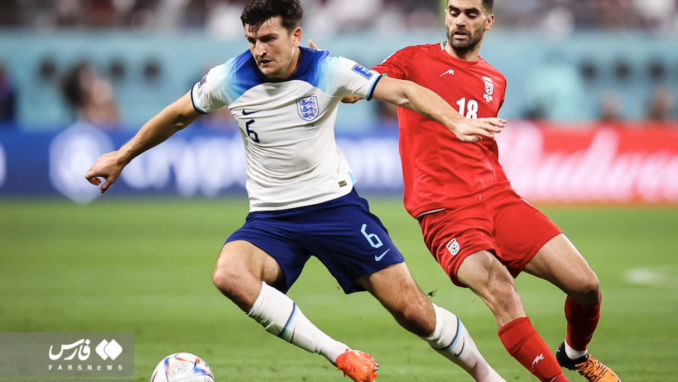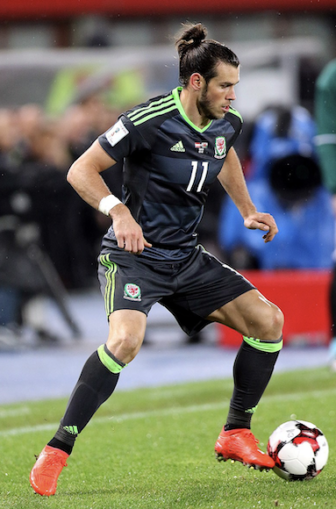
جام جهانی ۲۰۲۲ ایران ۲ – ۶ انگلیس,
Farsnews.ir – Licence CC BY-SA 2.0
The Football Association was formed on 26th October 1863, the Football Association of Wales on 2nd February 1876. One wonders what they got up to in the intervening years as it wasn’t until January 1879 that they played each other.
The fixture took place at Kennington Oval, home of Surrey Cricket club. Although named on the team sheet, England’s Reverand W Blackmore did not attend and was replaced by Eton old boy R. D. Anderson. The game lasted an hour. England won two one. The Yorkshire Post And Leed Intelligencer reported on a highly interesting game, being for the most part fast and closely contested. During the first portion, England had decidedly the best of the battle, but the visitors improved considerably as the game progressed, up to almost the last moment it was doubtful which side would secure victory.
England played a 2-2-6 formation with goalkeeper R D Anderson guarding the white line behind backs L. Bury and C.W. Wilson, half-backs N.C. Bailey and W. E. Clegg and forwards H. Wace(?) (captain), A. W. Cursham, W. H. Mosforth, E. H. Perry, H. E. Whitfield and T. H. Scorby.
According to the Post And Examiner, Wales appeared to play 2-2-8 with G. Glaecodine in goal, L.I. Kendrick(captain) and G. G. Higham at the back, W. Williams and T. Owen at half-back and Dennis, Heywood, J. Price, W. H. Davis, W. Shone, Digby, Owen and W. Roberts up front.
Presumably, rather than losing despite a two-man advantage, Digby Owen and Dennis Heywood were two players rather than four. Football reporting was also in its infancy. Scribes had yet to learn of taking care with first names, initials and commas.
Elsewhere in the football column (at the bottom of a sports page dominated by much more important hare coursing), Lancashire v Yorkshire had been called off by the weather. Frost and snow combined compelled the postponement of this annual match. It would be played on Wednesday next (weather permitting) on the Whalley Range Ground, Manchester. An omnibus was to leave the Albion Hotel, Manchester, to convey the players to a match that would commence not later than 2 pm.
Further north, the weather was even worse. Several inches of snow lay upon Hampden Park, Glasgow. The Scottish Counties fixture versus the Birmingham Association commenced all the same with the ‘Scotch’ winning 7-1. Already 2-0 up after five minutes, the home team made it five by halftime. The Englishmen pulled two back in the second half while the Counties added two to their own tally.
According to 11 v 11, the internet’s home of football statistics and history, in the 124 years of the fixture, England have played Wales 103 times. England’s 68 wins and Wales’s 14 victories leave 21 matches ending as draws.
Amongst England’s supremacy, there have been some thumpings. The score sheet is peppered with fours, fives and sixes. An 1896 Home International saw England net nine times. Not quite the Welshmen’s record defeat, they did pull one back against England but lost 9-0 to Scotland the year before the groundbreaking Oval fixture.
At one point Wales went 37 years without a win despite playing England every year in the Home Internationals. The worm turned in the early 1930s. A good run saw four victories out of six between 1933 and 1938. Another long winless stretch lasted from 1955 to 1977, broken by a 1-0 success at Don Revie’s Wembley,
Puffins will be more familiar with Shilton, Neal, Mills, Greenhof, Watson, Hughes, Keegan, Channon, Pearson, Brooking and Kennedy than with Victorian reverend gentlemen and Old Etonians. For Wales, Mike Smith fielded Davies, Thomas, Jones, Mahoney, Phillips, Evans, Sayer, Flynn, Yorath, Deacy and James. It was Burnley’s Leighton James who won the match, scoring from the penalty spot a minute before halftime after being pulled down by Peter Shilton following a mistake by Emlyn Hughes.
In the modern day, it is 38 years since a Wales victory. However, following the demise of the Home International championship, crowded out by European Championship and World Cup qualifiers, lucrative friendlies against top South American and Continental teams and dogged by violence at the England-Scotland Auld Enemy fixture, there have only been six matches between the two rivals since Wales won 1-0 at the Racecourse Ground in 1984. All six subsequent matches; two World Cup and two Euros qualifiers, a Euro group match and an international friendly, have been victories for England.
Your author was at that last Home International match, held in Wrexham one early May Wednesday evening. Tickets were available on the day at the ground. If I remember rightly, entry was three or four pounds.
The Wales team was Southall, Phillips, (Joey) Jones, Hopkins, Ratcliffe, G. Davis, A. Davies, Rush, (Mickey) Thomas and, making his debut, 19-year-old Mark Hughes whose 18th-minute header was the game’s only goal.
For the record, Bobby Robson fielded Shilton, Duxbury, Kennedy, Lee, Martin, Wright, Wilkins, Gregory, Walsh, Woodcock and Armstrong. Interestingly, three Southampton players, one from Luton, two from Manchester United and none from Liverpool. Not the strongest of England lineups, not only did they lose to Wales but failed to qualify for that summer’s 1984 European Championships in France.
As for me, I was in the paddock directly behind the goal opposite the Wales end. England flags adorned the fencing. A happy breed of men, we were fairly evenly divided between genuine fans, genuine hooligans and Chester supporters on a day trip to annoy Wrexhamonians. Before the days of turning down the sound to avoid grunted non-commentaries, woke nonsense and silly girlies, Barry Davies was about the place before the match and happy to chat. While walking around the pitch to reach the commentary position, he was happy to chat some more.
Different times indeed.

Gareth Bale playing for Wales vs Austria,
Steindy – Licence CC BY-SA 2.0
Fast forward those thirty-eight years and the two home nations meet again in the Qatar World Cup on Tuesday, November 29th at 7 pm our time. Due to their 6-2 win against Iran in their first fixture, and a 0-0 bore draw against the USA, England are bound to qualify for the knockout competition whereas a sent-off goalkeeper and two late goals in their game against Iran means Wales are doomed. Or are they?
Looking at the mathematics, because of the Three Lion’s better goal difference, Wales would have to win 4-0 to progress. With other Group B contenders the USA and Iran playing each other, and taking points off each other, England can’t really fail to take their place in the round of sixteen with Gareth Southgate being expected to take the opportunity to rest players, especially out-of-sorts Harry Kane.
Having said that, it might be worth going for the win to top the group and play a runner-up in the first set of sudden death matches.
If England win Group B then on Sunday, 4th December at 7 pm they will play the runners-up of Group A, almost definitely Ecuador or a Senegal side emasculated by the absence of Sadio Mane. If England finish runners-up, they will meet the winners of Group A, probably Holland, the day before at 3pm.
It goes without saying that winning is a habit and there is a huge advantage for any mindset that expects and is used to winning every game. But England play Garethball not football. Nicey values must be held while passing the ball back and forward in your own half. Don’t assume England will be unleashed onto the park like Terry Butcher’s caged tigers to win at any cost, or even try to win.
Southgate is such a disappointment that this correspondent predicts England will struggle against Wales and then be knocked out in the next round by Holland. After which an open-topped bus will tour Islington, Brighton and possibly Bristol, showing off rainbow armbands while taking the knee. Lineker’s refugee will be in attendance. Alex Scott will be held aloft. Somebody who can’t speak English will commentate for the BBC. Phil Foden will be left behind at the bus station.
Having said that, I’m often wrong. Previously I told Puffins many of the qualifiers in the expanded 32-team tournament weren’t good enough and you should pick your TV group matches carefully. I hope you ignored me.
Looking through the group tables it is a lot more keenly fought than I expected. At the time of writing, with six out of the eight groups having completed two matches, only one country has won both of their opening fixtures – France.
There have been some cracking results. Unfancied Japan beat Germany in the Axis derby then unexpectedly lost to a Costa Rica side whose opening game had been a 7-0 defeat to Spain. Saudi Arabia beat Argentina. Canada should have beaten an ageing Belgium side containing an Eden Hazard (too close to this side of a long injury) and a Kevin De Bruyne a shadow of his club self. Karma was in better form when Roberto Martinez’s side lost 2-0 to Morocco four days later.
Incidentally, Martinez has sat in the dugout at my lower division’s Local XI for a cup tie. Jordan Pickford was an on-loan goalkeeper here when a teenager and let six in the last time I went to an away game. Belgium’s Vertonhen has played on our hallow turf, as has England’s Kyle Walker. Romelu Lukaku would have played on it, but was frightened to get off the bench. One up on Wales’s Gareth Bale who, drawn against us in a previous cup competition, was too scared to get on the team bus and didn’t travel.
A one-degree-of-separation omen for Tuesday’s game? We shall see.
© Always Worth Saying 2022



